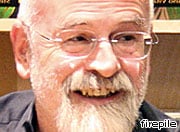The BBC stands accused of being a cheerleader for assisted suicide after deciding to show a man with motor neurone disease killing himself at a facility in Switzerland.
Due to be aired in the summer on BBC2, it will be the first time an assisted suicide has been shown on British terrestrial television.
The death will be featured in a documentary fronted by pro-euthanasia campaigner, Sir Terry Pratchett.
Cheerleader
Dr Peter Saunders, director of the Care Not Killing group, said: “The BBC is acting like a cheerleader for legalising assisted suicide.
“It is regrettable that a man’s death will be shown on screen but we are also concerned that this documentary will not be balanced.
“Given Sir Terry Pratchett’s position, the fear is that it will show all the supposed benefits of assisted death with very little redress.”
Romanticise
Conservative MP Nadine Dorries warned that the BBC was in danger of “normalising a very serious issue”.
She said: “It is pushing back a moral boundary. A programme like this will romanticise assisted death and dying.
“This is an authored piece so it will be one-sided. I hope the BBC is thinking of ways it can present the counter-argument.”
Zealous
It is not the first time that concerns have been raised about the BBC’s stance on assisted suicide or euthanasia.
Last year it faced allegations of pursuing an “incredibly zealous” campaign in favour of assisted suicide from Lord Carlile, the Government’s anti-terror adviser.
Over 20 MPs signed an Early Day Motion which accused the BBC of conducting a “multi-million pound campaign” to promote euthanasia.
Ignored
MPs said the BBC had disregarded the fact that “every disability rights group in the UK is opposed to the legalisation of assisted suicide and euthanasia”.
The MPs also said bias was shown in the BBC’s “thinly-disguised plays and soap operas” as well as its news coverage.
The BBC denies that it is biased on the issue. A spokesman said: “The BBC doesn’t have a stance on assisted suicide, but we do think that this is an important matter of debate.”
Defended
It also defended the decision to show an assisted suicide on TV. The spokesman said: “Death is an important part of the human experience and is integral to any discussions about assisted dying, which is why it is appropriate for it to be included.
“We know that watching a death can be distressing for some members of the audience, so we will ensure that clear warnings are given beforehand.”

